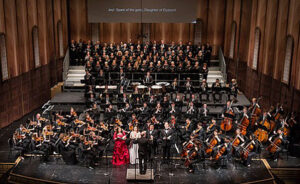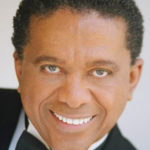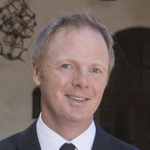
Review: Beethoven’s 9th with Music Academy Festival Orchestra
S.B. Choral Society Joins Academy Festival Orchestra for “Ode to Joy”
Thursday, June 25, 2015

This ambitious opening concert of the Music Academy of the West’s Festival Orchestra season featured the Santa Barbara Choral Society and four vocal soloists in order to fulfill the requirements of the finale to Ludwig Van Beethoven’s monumentalSymphony No. 9 in D Minor, Op. 125. The Ninth presents significant challenges for everyone involved, from the musicians and conductor charged with playing it to the person creating the evening’s program, as it is hard to pair with other works given its unconventional length. Fortunately for the enthusiastic audience at the Granada on this solstice-weekend Saturday, strong solutions to these obstacles were well in hand on every front.
Mason Bates wrote his “Ode” specifically to be played as the opening work in concerts of Beethoven’s Ninth, and it’s a dazzling reimagination of the original work in a contemporary idiom. Spinning the major themes of the great symphony in reverse, Bates discovered worlds of implication in fragments of melody. When the finale’s “Turkish March” theme sounds in this “Ode,” the entire string section stomps the stage in emphasis. The young fellows of the Academy Festival Orchestra clearly enjoyed playing this entertaining piece, which, by judicious selection and interpretation of Beethoven’s sprawling opus, succeeds in being more than a mere jeu d’esprit.
After intermission, conductor Larry Rachleff made a heartfelt dedication of the evening’s performance of Beethoven to the victims of the recent mass shooting in Charleston, South Carolina. In addition to being a gesture of solidarity with those affected by the tragedy, Rachleff’s remarks revealed the extent to which this work often looms as something greater than music to those who play it. By shaking up the symphonic vocabulary in his heroic middle period, Beethoven initiated a process in which the Ninth Symphony can be seen as both a departure and a culmination. Turning away from the theme of individual heroism so closely identified with his earlier symphonies, Beethoven in the Ninth embraces universal brotherhood and peace, rather than the creative triumph of the individual over historical circumstance, as the ultimate goal of human civilization.
If that sounds like a lot of weight for music to carry, consider these facts: This is incredible music, and it’s not all instrumental. Singers Dru Daniels, Emily Rose Lezin, Kevin Kyle Gino, and Ryan Thorn did an outstanding job enunciating the intricacies of Beethoven’s justly famous finale, as did Joanne Wasserman and her chorus. They had a long wait before the first word was sung in the fourth movement, but in the impact of this extraordinary departure from symphonic convention, all sense of time becomes relative. The remarkable facility with which Beethoven recapitulates the fantastic, massive themes of the first three movements serves as a launching pad for the soul-stirring appearance of his most popular song.
There’s so much more to say and to ponder about Beethoven’s Ninth that I’m sure the musicians and all the Music Academy patrons who were at this concert will continue to reflect on the night for weeks to come. Congratulations to the whole team that made such an extravagant opening artistic statement possible.

 American baritone, Ralph Cato has travelled the world extensively, telling stories in song with his warm, clarion baritone voice.
American baritone, Ralph Cato has travelled the world extensively, telling stories in song with his warm, clarion baritone voice. Tenor, Benjamin Brecher has performed over fifty operatic roles with many of the world’s most prestigious opera companies, specializing in the high lying lyric tenor repertoire. He has performed 16 roles with New York City Opera alone. Career highlights include performances with Opera Orchestra of New York, L’Opera de Nice, Rossini Opera Festival in Pesaro, L’Opera de Montreal, Santa Fe Opera, Opera Theatre of St. Louis, among many others. His orchestral solo repertoire includes Mozart, Handel, Orff, Bach, Haydn, as well as many performances of Britten. In 2000 he began performing the great Irish Tenor songs in a concert produced for him entitled A Celtic Celebration, Twenty years later, the show has become a North American hit with performances with 45 Symphonies in North America. Ben continues his discography having added his twelfth recording in 2016 Forgotten Liszt, with pianist Robert Koenig, and will record a new release in 2022 entitled “Three Centuries of Thomas Moore” including the music of Britten, Berlioz, and Sarah Gibson on MSR Classics. He is a Professor of Voice at University of California Santa Barbara, where he has served as the Head of Voice.
Tenor, Benjamin Brecher has performed over fifty operatic roles with many of the world’s most prestigious opera companies, specializing in the high lying lyric tenor repertoire. He has performed 16 roles with New York City Opera alone. Career highlights include performances with Opera Orchestra of New York, L’Opera de Nice, Rossini Opera Festival in Pesaro, L’Opera de Montreal, Santa Fe Opera, Opera Theatre of St. Louis, among many others. His orchestral solo repertoire includes Mozart, Handel, Orff, Bach, Haydn, as well as many performances of Britten. In 2000 he began performing the great Irish Tenor songs in a concert produced for him entitled A Celtic Celebration, Twenty years later, the show has become a North American hit with performances with 45 Symphonies in North America. Ben continues his discography having added his twelfth recording in 2016 Forgotten Liszt, with pianist Robert Koenig, and will record a new release in 2022 entitled “Three Centuries of Thomas Moore” including the music of Britten, Berlioz, and Sarah Gibson on MSR Classics. He is a Professor of Voice at University of California Santa Barbara, where he has served as the Head of Voice. Born and raised in Southern California, April Amante is a versatile soprano with expertise and facility in repertoire spanning from early music to contemporary musical theater.
Born and raised in Southern California, April Amante is a versatile soprano with expertise and facility in repertoire spanning from early music to contemporary musical theater. Tracy Van Fleet is pleased to return to the Santa Barbara Choral Society. As a soloist, she has performed with the Los Angeles Master Chorale, Lüneburg Symphony in Germany, Orquesta Filarmónica de Boca del Río in Mexico, Pasadena Symphony, Naples Philharmonic, Los Angeles Bach Festival, San Diego Chamber Orchestra, Colorado Philharmonic, USC Symphony and Chorus, and others. She has had many appearances with the Los Angeles Opera, Los Angeles Philharmonic, Pacific Symphony, Hollywood Bowl Orchestra, Opera Pacific, San Diego Opera and Opera Colorado.
Tracy Van Fleet is pleased to return to the Santa Barbara Choral Society. As a soloist, she has performed with the Los Angeles Master Chorale, Lüneburg Symphony in Germany, Orquesta Filarmónica de Boca del Río in Mexico, Pasadena Symphony, Naples Philharmonic, Los Angeles Bach Festival, San Diego Chamber Orchestra, Colorado Philharmonic, USC Symphony and Chorus, and others. She has had many appearances with the Los Angeles Opera, Los Angeles Philharmonic, Pacific Symphony, Hollywood Bowl Orchestra, Opera Pacific, San Diego Opera and Opera Colorado.